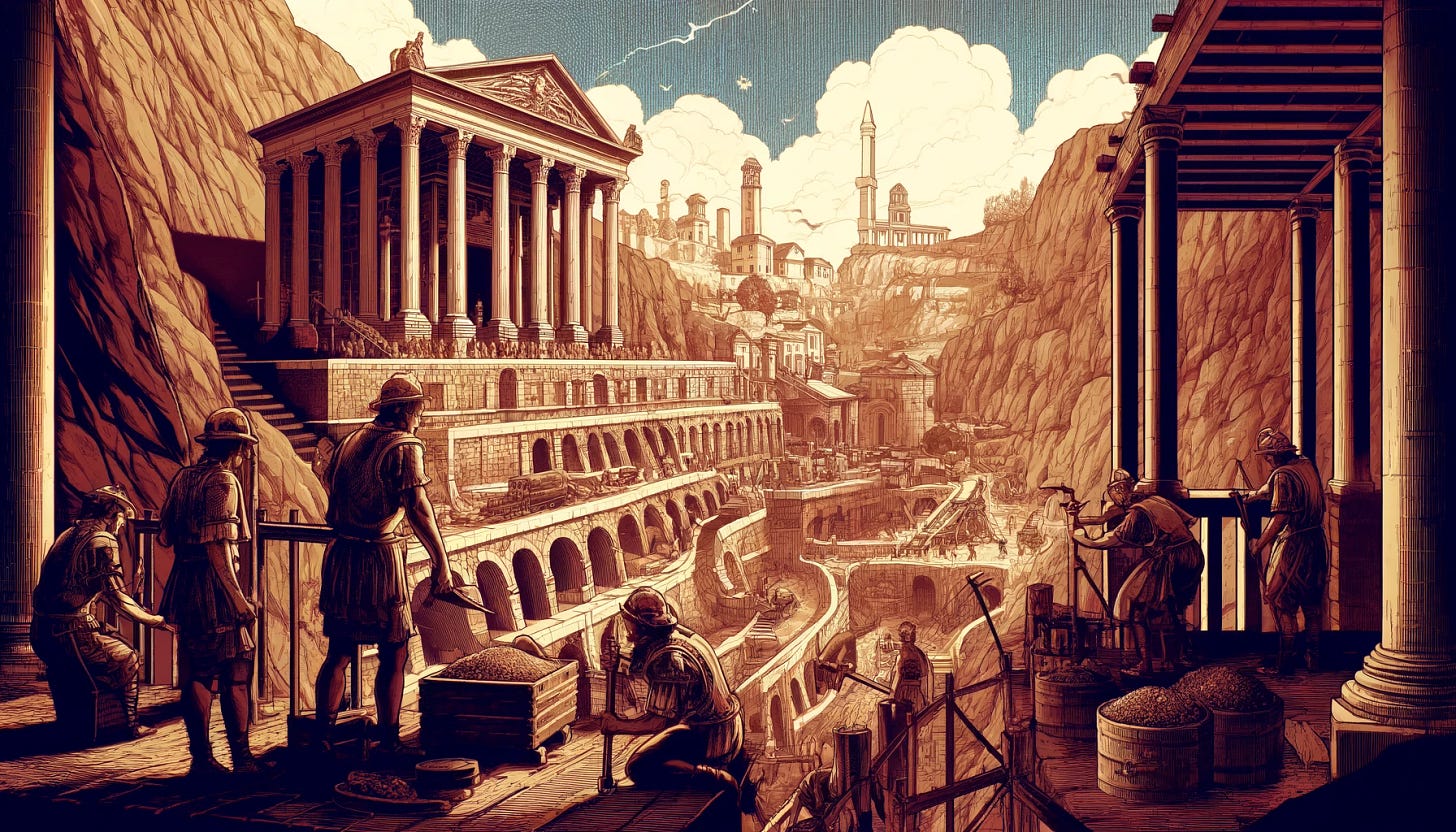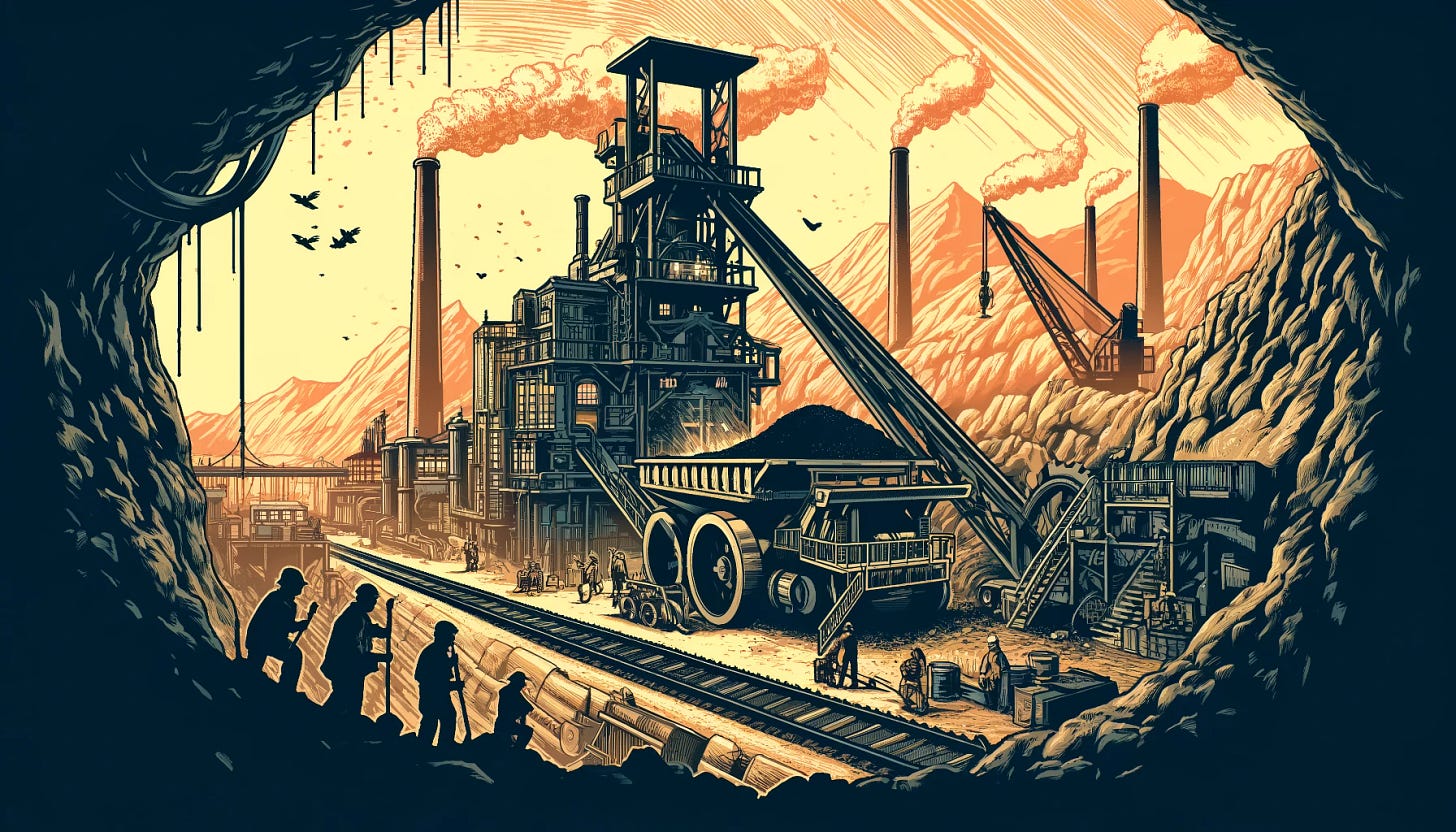Think about everything we’ve ever taken out of the ground.
All those thousands of years of mining for metals, minerals, and fossil fuels began before we were anatomically modern humans, and by the time of Göbekli Tepe, we were using bone and stone to dig. We couldn’t dig very deeply, and all of the operations around the world were small-scale and localized.
Still, we had our tricks, like fire-setting in order to heat rocks up, and then dousing them with water to break them apart much more easily. We quarried enormous rocks out of the ground, and then we started bringing copper and iron up.
By the time of the Roman Republic, some of that iron from the ground had been turned into digging tools. We could dig much deeper now, and social organization allowed for much, much bigger scale mines. Instead of a mere hole in the ground, these mines were now becoming complex underground networks.
Ventilation and flood prevention pushed innovations further along, and mining operations began to turn out millions of tons of rock, metal, and minerals every year.
By the time of the Industrial Revolution, we were figuring out how to use coal-powered machines to get more coal out of the ground. This virtuous and vicious cycle meant ever more stuff getting pulled up out of the ground.
Gunpowder and other explosives became more and more widespread, so instead of fire-setting, we could just blow up rocks that were in our way (or which contained metals or minerals we wanted).
Today, we have all of the intelligence and innovative power of the modern world being applied to mining technology, with automated drones scouting out areas where only humans could go before, with a much higher emphasis on safety. Even still, the conditions are often brutal and unsafe for the workers, and forced labor (a terrible euphemism for slavery) is all too common.
In addition to mining, we’ve also dug up an awful lot of ground in order to build cities, roads, and tunnels. Considering how much of our planet’s surface is now covered in urban infrastructure, it’s easy to see how significant this digging is.
Think about all the monuments and buildings created, the roads built, the wars fought through around 1940. Try to add all that digging up in your mind. Try to see all those tens of billions of tons of stone, metal, oil, coal, and dirt we’ve brought up out of the Earth.
Now realize that every single year, we dig more than that up out of the ground.
That’s right—the same forces that led to accelerating population growth have given rise to exponentially accelerating energy needs. This is a bit like Moore’s Law for digging stuff out of the ground.
Digging 90 billion tons of stuff out of the ground a year (never mind burning a significant portion of it for energy) has certainly done plenty of damage to the planet, and that number is likely to grow. Even as we find more efficient ways to do things, we keep finding more things we need to do.
I’ll leave you with some cold comfort: even though we’ve dug up several trillion tons of stuff, the Earth’s surface is very, very big. 2.8 x 10^22 kilograms, give or take. If we use 6.4 trillion tons of stuff dug up and do a little math, that means we’ve dug up only about 0.0000207% of the total mass of the crust of the Earth so far.
In spite of the amount of Earth we’ve dug up being proportionally small, the impact is anything but insignificant. We've unlocked remarkable progress and propelled ourselves to unimaginable heights, but this progress has come at a cost, and it’s on us to make sure we handle the future responsibly.
Did thinking about this blow your mind as much as it did mine? What else is left on your mind after reading this?







The article blew my mind and set me thinking. Years ago, the Russians dug a hole with the intention of reaching the earth's core. The project was abandoned. What could be the ramifications if different nations start to dug holes with the intention of reaching the earth's core?
It impacts the study of history, sure enough. In a place like England, with thousands of years of history, each new discovery under the ground is a revelation.